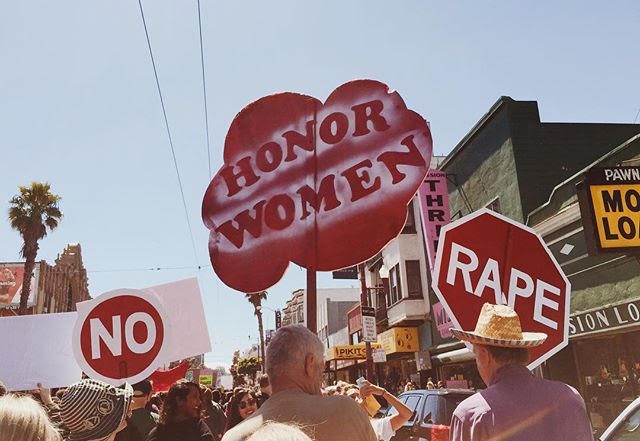As two presidential candidates who have been accused of sexual misconduct battle it out for the White House (fine, the future of democracy in the United States), domestic violence rates have risen, driven by the COVID crisis. Against this dire backdrop, the local chapter of the Coalition of Anti-Rape Advocates [CLARA] decided to shift its survivor advocacy work to the San Francisco elections.
As a result, local voters can now read questionnaires from 30 local candidates on how they plan to address sexual assault issues on the CLARA website.
“We think that sexual violence should be an issue that candidates are talking about,” CLARA member Emma Hyndman tells 48 Hills. “We wanted to focus on the local election. In San Francisco, we think the city has already started that conversation, but we really want to make sure that it’s more present.”
Candidates were asked to weigh in on whether they would support appointing a survivor or advocate to the police commission, whether they would take the lead on making SHARP and law enforcement’s findings on sexual assault public, and whether they would sponsor the recommendations put forth by the Safer Schools Sexual Assault Task Force, among other issues.
The group sent out 65 questionnaires, one to every candidate for District Supervisor, Community College Board, BART Board, State Senate, and California’s House of Representatives that was registered on the city’s website with a valid email address.
A note on CLARA’s website says the voter education guide was inspired by similar questionnaires posited by the League of Pissed-Off Voters and the San Francisco Bike Coalition.
The candidates had only 10 days to respond during a hectic campaign season—even so, 30 of the questionnaires were completed and sent back. Among the respondents were State Senator Scott Weiner challenger Jackie Fielder, 17 candidates for the Board of Supervisors, and Nancy Pelosi Congressional challenger Shahid Buttar—whose own campaign was rocked by accusations of sexual harassment.
“Having someone like Jackie Fielder, who’s running for State Senate, talk about support for a survivor-advocate on the police commission—that’s a cool thing because it’s true, that’s beyond her scope,” said Hyndman. “But you need the local, you need the state level organization to make those kinds of things happens. Getting everybody on the same page is really cool.”
“We were shocked and pleased about how many people responded and took this seriously,” says Hyndman, who says the group is in the process of making Spanish translations of the candidates’ responses available on its website.
CLARA was founded through a series of conversations that took place this summer. In addition to its active Bay Area chapter, the Coalition unites the work of anti-rape activists in Texas, Minnesota, Oregon, and North Carolina.
San Francisco city government has taken certain steps to hold itself accountable to survivors. Driven by the efforts of Supervisor Hillary Ronen, the Office of Sexual Harassment and Assault Response [SHARP] was founded in 2018 in order to address poor treatment that survivors were receiving at the hands of law enforcement and other governmental agencies.
Nowadays, survivors can keep the city responsible for supporting them by sending complaints of subpar treatment to SHARP.
But CLARA still sees great need for improvement when it comes to supporting undocumented survivors, houseless survivors, and in preventing sexual assault in California’s gigantesque prison industrial complex.
“The SHARP office is great, but obviously the city isn’t doing enough because we hear stories coming out of San Francisco police department and their mishandling of cases, not treating survivors correctly,” says Hyndman.
“So to treat [sexual assault response] as a local issue, especially in a place like San Francisco that has the resources to do something about it—we just thought was a really good opportunity to access local candidates and hear what they have to say,” she continues.
Hyndman says she was enthused not just by the quantity, but quality of responses received. Many candidates were willing to speak to issues outside their jurisdiction—an early sign, Hyndman says, of the kind of multi-level coalition that will be necessary to tackle tough issues within governmental response and prevention of sexual assault and harassment.
She also lauded some candidates for providing concrete examples of how they would leverage their power to make things better for survivors, singling out Dr. Victor Olivieri, candidate for CCSF Board and current chief of staff at UC Riverside. In his questionnaire, Olivieri talked about implementing a CARE Advocate Office (Campus Advocacy, Resources & Education) similar to the one currently functioning at the Riverside campus that would provide education on stalking, domestic violence, and other issues to students.
“Violence at the community college level isn’t really talked about that often when we’re talking about campus sexual violence,” said Hyndman. “So to have candidates who would want to focus on that a little bit more would be really exciting.”
Read CLARA’s voter education guide here, including responses from the following candidates:
House of Representatives
Shahid Buttar, CA-12
State Senate
Jackie Fielder, CA-11
Board of Supervisors
Andrew Majalya, D1
Marjan Philhour, D1
Veronica Shinzato, D1
Connie Chan, D1
Daniel Landry, D5
Aaron Peskin, D3
Danny Sauter, D3
Vallie Brown, D5
Dean Preston, D5
Joel Engardio, D7
Myrna Melgar, D7
Ben Matranga, D7
Dr. Emily Murase, D7
Vilaska Nguyen, D7
Hillary Ronen, D9
John Avalos, D11
Ahsha Safai, D11
Board of Education
Matt Alexander
Kevin Boggess
Jenny Lam
Community College Board
Jeannette Quick
Marie Hurabiell
Dr. Victor Olivieri
Geramye Teeter
Alan Wong
Tom Temprano
Aliya Chisti
Shanell Williams
Han Zou
BART Board, District 9
Dave Young
Michael Petrelis
Bevan Duffy





